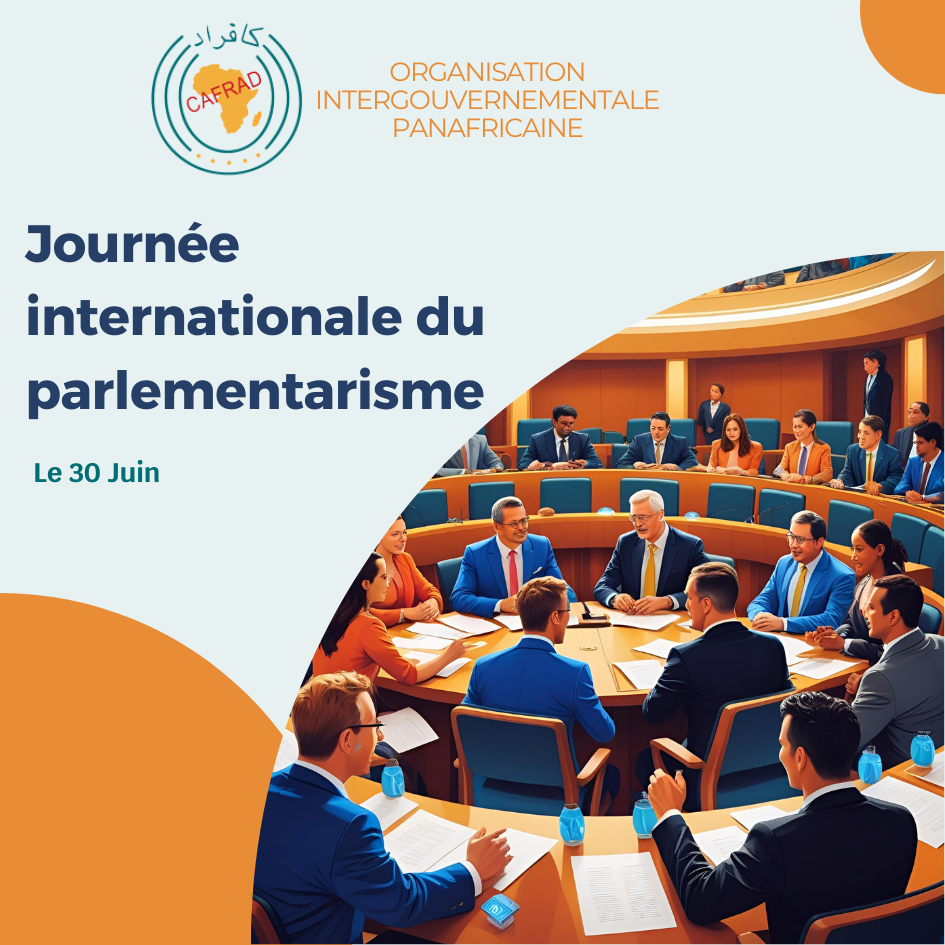International Day of Parliamentarism: A celebration of democracy and a call to action for more inclusive governance in Africa

June 30th marks the International Day of Parliamentarism, celebrated worldwide since its adoption by the United Nations General Assembly in 2018. This day aims to highlight the fundamental role parliaments play in consolidating democratic systems, defending human rights, drafting laws, representing citizens, and overseeing government action.
In Africa, this commemoration takes on particular significance, as issues related to governance, institutional modernization, and citizen participation are central to development dynamics. On this occasion, the Pan-African Intergovernmental Organization (CAFRAD) wishes to commend the growing commitment of African parliamentary institutions to strengthening the rule of law, promoting transparency, and consolidating democratic values.
Parliament: A Key Institution of Modern Governance
In all democratic systems, parliament constitutes a cornerstone of the institutional system. Through its legislative, budgetary, and oversight functions, it ensures checks and balances and ensures that public policies are designed and implemented in the public interest. It gives a voice to populations, particularly historically marginalized groups, by translating their needs and aspirations into concrete actions.
In African countries, parliaments have gradually strengthened their role in reform processes, ensuring the implementation of fairer, more transparent, and more participatory public policies. They have also become essential platforms for dialogue, deliberation, and mediation, particularly in contexts where political and social tensions require informed and inclusive arbitration.
Challenges and Prospects for African Parliaments
While progress has been made, African parliaments continue to face numerous challenges. These include insufficient human and financial resources, a lack of technical capacity, the sometimes dominant influence of the executive branch, and limited public access to parliamentary proceedings. Added to this are persistent threats to freedom of expression, the low representation of women and young people in parliamentary chambers, and profound changes linked to the digital, economic, and ecological transitions, as well as artificial intelligence.
In a context marked by rising citizen expectations, the growing complexity of public issues (climate change, security, youth employment, health, etc.), and the emergence of new forms of participation, African parliaments must reinvent themselves. This notably involves improving the quality of legislative work, increased transparency, greater openness to the public, and the ability to integrate digital technologies into deliberative and oversight processes.
CAFRAD’s Role Alongside Parliamentary Institutions
Since its creation in 1962, CAFRAD has worked to strengthen the institutional capacity of African public administrations. In this context, it maintains close partnerships with national and regional parliaments, convinced that their involvement is essential in any dynamic of public reform and transformation.
This vision has been realized through the organization of several targeted activities, including the Legislative Training Course on Budget Management and Oversight by Parliaments, which aimed to equip MPs and their staff with the skills necessary to exercise rigorous budgetary control and ensure better accountability.
In addition, the organization of the Pan-African Parliamentary Conference on Capacity Building was a high-level forum that enabled African parliamentarians to collectively reflect on current challenges in governance, legislation, and citizen participation.
These initiatives illustrate CAFRAD’s commitment to promoting parliamentary governance based on expertise, transparency, and innovation. Through training programs, specialized workshops, and thematic forums, the Center continues to support African legislative institutions as they evolve toward greater efficiency, closer contact with citizens, and an active contribution to sustainable development processes.
A call for renewed commitment
In celebrating the International Day of Parliamentarism, CAFRAD reiterates its call for collective mobilization to make African parliamentary institutions more democratic, resilient, more inclusive, and closer to citizens. Parliaments must combine participatory and deliberative democracy and integrate inter-parliamentary diplomacy. This Day is not only a moment of recognition, but also an opportunity for reflection, self-examination, and engagement.
In the current context where democracy is being fiercely contested on the continent, singled out as the scapegoat for all evils, Africa’s democratic future inevitably depends on strong, representative, ethical, innovative and responsible parliaments. CAFRAD will continue to work alongside its African and international partners to support this shared ambition of public governance that serves sustainable development, human dignity and social justice.




